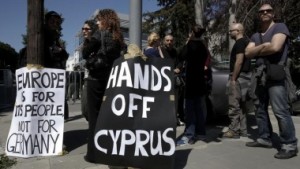
Les Echos
The press and the European public opinions are not impressed by the latest agreement made behind closed doors between the recently elected president of Cyprus, Nicos Anastasiades, and the EU in order to assure a €10 billion bailout for Cyprus. According to the agreement on the bailout, all Cypriots will have to chip in. As per the Financial Times, “under a controversial deal struck with international bailout lenders in the early hours on Saturday, a 6.75 percent levy would be imposed on all deposits under €100,000 while accounts over that threshold would be hit with 9.9 per cent levy.” Such rates are currently being discussed in Brussels and could be lowered. The Cypriot President declared that he was facing a “blackmail” from the eurogroup and was left facing a dilemma in choosing between either a default and the exit of the euro or taxation on all bank deposits.
One of the rationales for such approach is because Cyprus has been a money heaven. Cyprus banking sector is considerably oversized, like Iceland, proportionally to its GDP. Krugman demonstrated that the three Islands – Iceland, Ireland and Cyprus – have had banks with assets that were around 800 percent of Cyprus’ GDP, 980 of Iceland’s GPD, and 440 of Ireland’s GDP. However, “The Cyprus bailout deal forcing losses on all bank customers – from pensioners to Russian oligarchs – is leading to bank run which sets a dangerous precedent for other troubled eurozone countries.” Such move is a direct attack by Cypriot leaders on their banking model developed these last decades. Furthermore, this could only be the opening act, as austerity measures designed by the troika – IMF, ECB, and Commission – may very well follow. These

afp.com/Christos Avraamides
measures have had disastrous consequences in the PIGS countries and would have similar effects in Cyprus. As argued by Krugman, targeting the Russians may be one thing, but the haircut will be felt as well on Cypriots.
Two years ago, I interviewed an expert, Dr. Maria Lorca-Susino, on the possible default of Greece. Dr. Lorca-Susino argued that it was all about politics. The Cyprus move certainly looks like it as it has no economic rational. Experts like Munchau of the FT and other economists such as Paul Krugman are worried of a possible bank run. Removing liquidity from the banks is a path to disaster and could lead to a bank run. Reuters recently announced that Cypriot banks will remain close on Tuesday and Wednesday pending on the decision of the Parliament. Felix Salmon of Reuters wrote on the bailout deal: “Don’t for a minute believe that this decision is part of some deeply-considered long-term strategy which was worked out in constructive consultations between the EU, the IMF and the new Cypriot government. Instead, it’s a last-resort desperation move, born of an unholy combination of procrastination, blackmail, and sleep-deprived gamesmanship.”
This latest agreement underlines several aspects: first, what were the policy-makers thinking? As argued in the FT op-ed of March 18, “the biggest risk is political. The prescription of universal austerity combined with kid-gloves treatment of big investors in banks is increasingly toxic to European voters. Leaders have just added fuel to the fire.” Such political move will contribute to sending a message across Europe in favor of nationalist parties promoting a return to fully independent and sovereign nation-state and a return to national currencies. Second, the EU is already not well perceived in Southern Europe, so this may very well

REUTERS/Yorgos Karahalis
contribute to increasing of the gap between Brussels and European capitals. The EU and the euro are not at their highest approval rating in the PIGS countries and the rest of Europe. This will affect the credibility of the common currency and the narrative for deepening the Union. Third, where is the demos once again? The gap between Brussels and the European demos is widening. This latest accord certainly did not include Cypriots in the equation as they are the big losers. The eurozone has always been the epitome of European democratic deficit where European technocrats rules behind closed doors without any democratic supervisions. In my recent review of the excellent documentary by “Great Decisions in Foreign Policy” on the eurozone, I concluded on the importance of increasing the democratic representation in Brussels. Habermas has been calling for the EU to make a choice in becoming either a transnational democracy or a post-democratic executive federalism. Once again, the case of Cyprus is a reminder of the democratic dilemma facing the EU. Neither the banking or fiscal union would solve this problem. Fourth, this could be the beginning of the end for the creation of a banking union. If the EU has the power to force countries to implement such radical policies on a country, it is not difficult to imagine the voices of populist and nationalist movements across Europe using this case in order to block any types of further integration. The EU was a model for fostering peace and stability, it seems to have lost its mind and mission in the middle of this crisis.